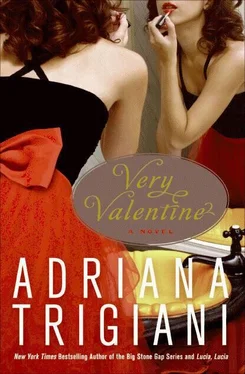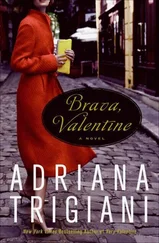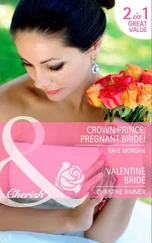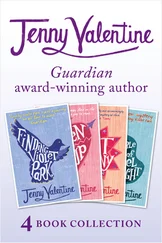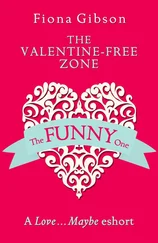“I’ve set a table for us.” He motions to the door. “Please.”
I follow him into the dining room, where the balloon shades in the front window have been lowered halfway. There must be fifty white candles of all different sizes and shapes placed around the restaurant, throwing sheer nets of pink light up the walls. Rows of flickering votive candles in etched crystal holders are placed in small stone alcoves under the mural, their tiny orange flames forming a choir.
I check my watch. It’s two o’clock in the morning. I rarely eat past seven. I haven’t been out this late since I moved to the Village. I can’t believe it. I’m actually having fun . I catch my reflection in the mirror, and this time, miraculously, no number elevens appear between my eyes. Either I’ve been transformed by the youth-enhancing steam facial from the risotto pot, or I like how this evening is going.
“Go ahead. Please. Sit down,” he says.
“This is beautiful.”
“It’s just a backdrop.” Roman places on the table a platter of delicate fried pumpkin blossoms that have been dipped in a light batter.
“For what?”
“For our first date. Lose the apron.”
I pull the apron over my head and drape it over the back of a chair at the next table. I unfold the napkin on my lap, and reach for a pumpkin blossom. I take a bite. The delicate leaf, dipped in this crispy batter, is as light as organza.
Roman goes back into the kitchen and comes out with a hot loaf of bread, wrapped in a bright white cloth, then returns to the kitchen.
While he’s gone, I notice the table setting, each detail proper and deliberate. I’ve never seen this china pattern, so I flip the bread plate over and check the seal. The plates are Umbrian, a bold design called Falco, which shows hand-painted white feathers on a vivid green field. The pattern provides a splash of color on the black lacquer tabletop.
Roman returns with a small tureen that he places on the table. He loosens the cork on a bottle of Tuscan Chianti and pours wine into my glass, then his own. He sits down at the table. He picks up his wineglass. “Good wine, good food, and a good woman…”
“Oh, yes. To Bruna!” I raise my glass.
As Roman ladles the risotto onto my plate, a buttery cloud floats up from the dish. Risotto is a tough dish to pull off. It’s labor intensive, you must stir the rice grains until they puff up or your arm falls off, whichever comes first. It’s all about timing, because if you stir too long, the rice will turn into a goop of wallpaper paste, and not long enough-you’ve got broth.
I take a taste. “You’re a genius,” I tell him. He almost blushes. “Where’d you learn how to cook?”
“My mother. We had a family restaurant in Chicago. Falconi’s, in Oak Lawn.”
“So why did you come to New York City?”
“I’m the youngest of six boys. We all worked in the family business, but my brothers never saw beyond the fact that I was the baby of the family. Even in my thirties, I couldn’t break that birth-order rap. You know what that’s like, don’t you?”
“Alfred is the boss, Tess is intelligent, Jaclyn is the beauty, and I’m the funny one.”
“So you get it. I’d been working for the family since I was a teenager. My mother taught me how to cook, and then I went to school and learned some more. Eventually, I wanted to take what I’d learned and make some changes in the restaurant. It soon became apparent that they liked the restaurant just the way it was. After a lot of wrangling, and nearly drowning in my mother’s tears, I left. I needed to make it on my own. And where better to make your name as an Italian chef than here in Little Italy.”
Roman refills our glasses. There’s a lot of common ground between us. Our backgrounds are similar, not just the Italian part, but the way we are treated in our families. Even though we’ve both made some bold choices and gotten real-life experience, our families haven’t changed their perceptions of us.
“So how did you decide to join the family business?” he asks. “Not too many shoemakers out there these days.”
“Well, I was teaching school, ninth grade English, in Queens. But on weekends, I’d go into the city and help Gram in the shop. Eventually, she began to teach me things about making shoes that went beyond packing and shipping. After a while, I was hooked.”
“There’s nothing like working with your hands, is there?”
“It takes everything I’ve got-mentally, physically. Sometimes I’m so bone tired at the end of the day I can hardly make it up the stairs. But the work itself is just part of it. I love to draw, to sketch the shoes and come up with new ideas, and then figure out how to build them. Someday, I want to design shoes.” This wine has put me in a cozy place. I just confided my dreams to a man I hardly know in a way I rarely ever admit, even to myself.
“How long have you worked with your grandmother?” he asks.
“Almost five years.”
Roman lifts another pumpkin blossom from the plate. “Five years. So that makes you about…?”
I don’t even blink. “Twenty-eight.”
Roman tilts his face and looks at mine from a different angle. “I would have guessed younger.”
“Really.” I’ve never lied about my age, but being almost thirty-four years old seems like a good time to start.
“I got married when I was twenty-eight,” he says. “Divorced at thirty-seven. I’m forty-one now.” He rattles off the numbers without the slightest hesitation.
“What was her name?”
“Aristea. She was Greek. To this day, I’ve never seen a woman more beautiful.”
When a man tells you that the most beautiful woman in the world is his ex-wife, and he’s been looking at your face for over an hour, it sets like a bad anchovy. “Greek girls are Italian girls with better tans.” I sip the wine. “What went wrong?”
“I worked too much.”
“Oh come on. A Greek would understand hard work.”
“And-I guess I didn’t work hard enough on the marriage.”
I look at Roman’s handiwork-the mural, the candles, the feast on the table-and then I look in his eyes, which I’m beginning to trust. I can talk to this man. It’s almost effortless. I feel badly that I lied about my age. This could be the first date of many; now what do I do?
“I’m glad you called me-,” he begins.
“There’s something I need to tell you,” I interrupt. “I’m thirty-three.” My face turns the color of the red pepper slices in the crudité dish. “I never lie, okay? I just did because, well, thirty-three seems almost thirty-four, and that seems like a number that’s getting up there. You should know the truth.”
“No worries. You don’t go out with Italians. Remember?” He smiles. Then he gets up from his chair and comes over to me. He takes my hands in his and pulls me up to stand. We look at each other in that way people do when they’re deciding whether or not to kiss. I feel guilty that I told Gabriel Roman’s nose was like the one with the Groucho Marx glasses. From this angle, his nose is lovely, straight and absolutely fine.
Roman takes my face in his hands. As our lips meet for the first time, his kiss is gentle and sensual, and very direct, like the man himself. I might as well be on the Piazza Medici on the isle of Venice, as his touch takes me far from where I stand and off to someplace wonderful, a place I haven’t been in a very long time. As Roman slides his arms around me, the silk of my dress makes a rustling sound, like the dip of an oar into the canal in the mural behind him.
The last man I kissed was Cal Rosenberg, the son of our button supplier from Manhasset. Let’s just say it didn’t leave me wanting more. But this kiss from Roman Falconi, right here in this sweet restaurant on Mott Street in Little Italy, with my feet in gunboat clogs, makes me feel the possibility of a real romance again. As he kisses me again, I slide my hands down his arms to his biceps. Chefs, evidently, do a lot of heavy lifting, whereas button suppliers and hedge fund managers don’t.
Читать дальше
